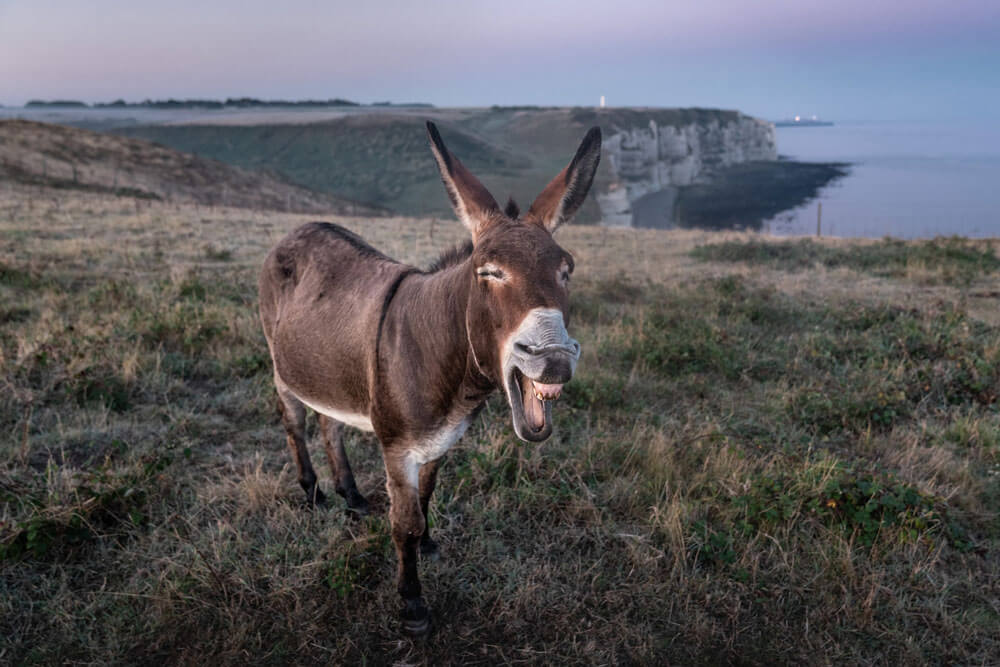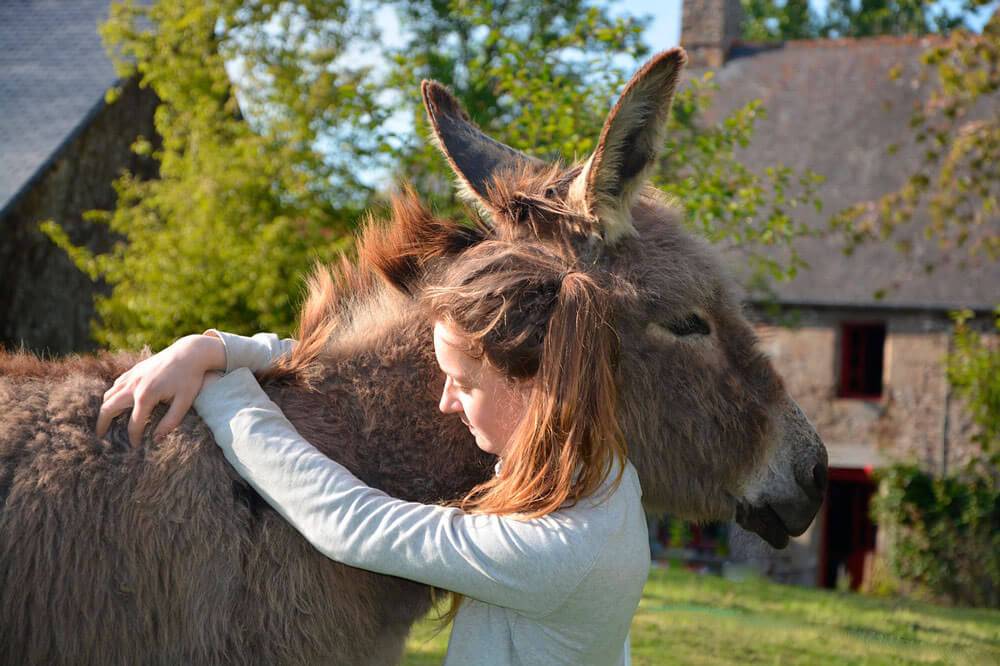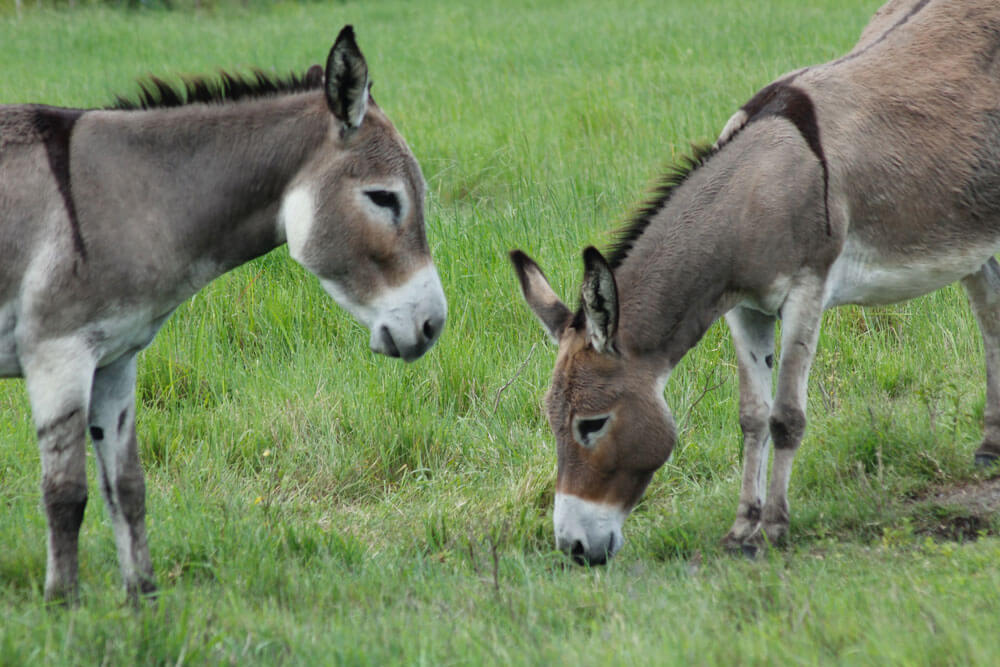Donkeys are not as pricey as horses, although they need solid care too. If you decided to get a donkey, its cost is the first thing you may be wondering. A donkey price is $300 to $4,000 and above. Loads of aspects are taken into account when the owner sets a price for their animal, including its age, gender, breed, and others. Let’s lay it out in order.

What Factors Affect the Price?
As you can see a donkey can cost a few bucks as well as a fortune. Why such a wide range? The reason lies in the huge array of features the animal may have.
If you’re looking for a farm companion with no “royal blood” and “extra features”, you may search for rehoming or rescue donkeys. Such animals are likely to be offered with no charge. That would be a good deed to shelter an animal and take care of it. You could get a lovely chum and save some budget, what a win-win!
On the contrary, if your purpose is an excellent companion for working or showing, get ready to fork out for it. Besides, there are miniature donkeys available that can be kept as a pet your kids can play with. Experienced donkeys with top-notch pedigree and exquisite built will cost a pretty penny. The price starts at $1,500 and goes up.
Horses are also different in breed, riding purpose, conformation, temperament, etc. And the value changes respectively. Like well-trained horses cost the earth, the same goes for donkeys.
And keep in mind that buying a donkey is merely half the story. Once you get an animal, you should constantly care for your little buddy like with the rest of the farm members. A price tag is just a one-time payment, stand by to cover regular bills. Let’s get all ins and outs of must-have expenses.

Is Everything Set?
We recommend you to get all preparations done before you purchase a donkey. That means you have to think wisely over services your new pal is going to be provided. It’s easier to deal with the facilities in advance so you can flawlessly bring a new member home. Here’s what you need to consider.
Where you’re going to place a donkey. Think about a comfy spot where the animal will live and rest. If you have a barn, that’s perfect. If no, make a shed to shelter your fellow, that will be enough. Make it sturdy to protect pets from rain, snow, sun, and other weather conditions.
In addition, look for a pasture where the donkey will be chilling around. As the animal is not going to stay at the barn all the time, it also needs a place to turn out. An oper air grazing is a great option for warm seasons. When the weather is getting colder, you may consider making a winter grazing or a concrete yard inside the barn. Don’t forget to make a fence to outline the territory.
Think of health care. Look for a local vet if you haven’t done it before. It’s better to find an option near you in case of an emergency. Donkeys, like horses, need to be checked on an ongoing basis. Contact your vet to get the vaccination and deworming plan based on your pet’s state of health. Don’t neglect to see a vet as further complications may cost you much more than you saved.
The same goes for a farrier for hoof care. Especially if you’re going to use the animal as a working donkey, this facility may come in handy.

Deal with food supply. Hay represents the main part of nutrition for donkeys as well as horses. You should look for local suppliers to provide your companion with the necessary amount of feed. The local company will help you save time and extra bucks on delivery.
Apart from hay and haylage, donkeys need to consume a small amount of fruit and vegetables like apples, carrots, turnips, and bananas. Don’t forget about food supplements like minerals and salt blocks to saturate their nutrition. Contact your vet to get your feeding plan.
Grab all the knick-knacks. Lots of stuff should be prepared before the donkey arrives. These include:
- a grooming kit (combs and brushes);
- tack gear (halter, saddle, bridle);
- barn supplies (feed bowl, heated automatic waterer);
- food supplements;
- and many others.

The Cost of Owning a Donkey
So you’ve got a donkey, what’s next? Now you should provide all the necessary options for housing, feeding, watering, vet appointment, and so on. To get things done, you should be aware of the average prices.
Shelter Cost
- Shed Installing: $2,000 to $4,000.
- Fencing: $1,500 to $3,000.
- Water tank: $100 to $700.
- Water tank heater: $200.
- Feeding Trough: $20 to $200.
- Bedding: $30 to $50 per bag (that can be used for a couple of days).
- Electric and water bills: $50 to $100 per month.
Feeding Cost
- Hay: $10 to $50 per bail (while donkeys need about 15 pounds of hay per day).
- Hay net: $10-$50.
- Fruits and veggies: $30 per month.
Vet Cost
- Vet examination: $100 per visit.
- Dental check: $70 per visit.
- Fecal count: $30 per visit.
- Deworming: $25.
- Fly spray: $25.
Farrier Cost
- $50 to $300 per month (depending on the service and location).
Training Cost
- $40 to $80 per lesson.

Summary
Getting a new pet is a great responsibility. Thus, think wisely of the bare essentials you need to prepare. Donkeys need proper feeding, watering, vet checking all year round. You should get duties done to provide your new fellow with a living spot.
We made a checklist for you so you can arrange your budget seamlessly. Housing and fencing are the very first things to consider. Then search for a food supplier to feed the donkey with proper meals. Farrier and vet are not referred to as an everyday routine but still, you should keep a track of these things. Such facilities are the most pricey from the list.
Once you purchase a donkey, you’ll get an outstanding companion for working or riding.
